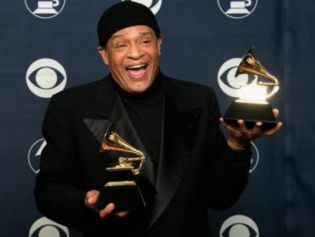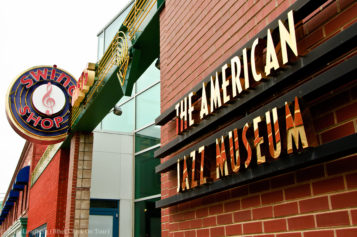Trumpeter Christian Scott is well aware of the history of jazz, but he looks ahead, rather than back.
In recent years, some listeners have felt that jazz has been stuck in the groove of a post-bop record that has played for far too long. During his Aug. 25 late-night set at New York’s Blue Note, Scott drew from his own humanity—as a musician and a black man—to illustrate his vision of pushing the art form forward.
Much of the set included music from his new double album, Christian aTunde Adjuah (Concord Jazz), which merges personal introspection with political commentary. The song “Danziger” was inspired by the Sept. 4, 2005, police shooting in New Orleans that injured four people and killed two residents attempting to escape Hurricane Katrina by walking over the Danziger Bridge into the Algiers neighborhood. At the Blue Note, Lawrence Fields’ melodic piano, coupled with drummer Jamire Williams’ slight rhythmic snares, framed much of the contemplative opening. Scott entered quietly on trumpet as if to explain the incident musically.
The inclusion of 21-year-old saxophonist Braxton Cook, who joined the group during its weekend engagement, was an inspired choice. Cook’s texture and tone channeled the spirit of John Coltrane’s “Alabama.” From his unwavering high notes to his forceful shouts of anger projected toward the audience, Scott transported us back to that incident seven years ago.
Scott’s natural charm and candor were on display as he introduced the members of his band, which includes guitarist Matthew Stevens, bassist Kris Funn and drummer Jamire Williams. But the trumpeter is also capable of channeling intense emotion, as on songs like “Jihad Joe,” driven by Stevens’ rock-tinged guitar and Williams’ rhythmic kick drum flare, and on “Ku Klux Police Department (K.K.P.D.)”—from 2010’s Yesterday You Said Tomorrow—a song inspired by his own experience of an unwarranted traffic stop.
On “New New Orleans,” perhaps the most uptempo song in the set, an array of musical influences can be heard—from hip-hop and bounce music to the straightahead jazz of Scott’s clarion trumpet and Cook’s alto saxophone. Scott and his talented group continue to challenge notions of what jazz should sound like today.
DownBeat caught up with Scott before his performance at the Blue Note to discuss the inspirations behind Christian aTunde Adjuah, his most personal album to date, and his opinions on the future of jazz.
What inspired you to make the album Christian aTunde Adjuah?
There was a lot going on in my life when I started to write the music for the record. I had gotten engaged, finished most of the elements that were going into my “stretch music” and tried to make a cohesive sound from which to build. A lot of things were inspiring me. The most linear one is probably me getting to the point where I was fed up with exclusively navigating the world as “Scott.” With the last record, Yesterday You Said Tomorrow (Concord Jazz), if I were in grad school and that was my thesis on stretch music, [then] Christian aTunde Adjuah is the first real stretch music document.
There were so many theoretical things that I was going through and trying to figure out musically. Not thinking psychologically put me in a place where I was questioning everything, and one of the things that affected me most was what I was being called…
Read more: DownBeat

